Today we talk to Rosie Mellerick-Wheeler, who works for Powys People First, about self-advocacy. Powys People First helps to organise self-advocacy groups for people with a learning disability across Powys. We were interested to know how self-advocacy could work for people experiencing poor mental health.
What brought you to work in the field of self-advocacy?
My background is in drama, and I wanted to go down the road of dramatherapy. So, I first volunteered with Theatr Wildcats (a drama group based on self-advocacy and the sister project to Powys People First) in 2014 and at the time had no clue what self-advocacy was!
From there I learnt about Powys People First and the amazing work they do. Fast forward to 2018 and I started to work as a self-advocacy facilitator for Powys People First and Theatr Wildcats.
What is self-advocacy?
I asked the members the following few questions as they are the experts on self advocacy and the benefits!
What is self-advocacy?
I asked the members the following few questions as they are the experts on self advocacy and the benefits!
- Speaking up for yourself and having your voice heard.
- Letting people know what and how we want things.
- Asking for help if we need it.
- Supporting each other as well as ourselves.
- Being inclusive.
Why is it important for people to speak up?
- To make sure we get the right support and help if needed.
- To feel in control of your own life.
- To make sure we make the choices that effect our lives.
- It is good for your mental health, to be happy and be in a place that makes you smile.
- It helps with sad and angry emotions, there is less frustration when our voices are heard.
What could happen if people didn’t speak up?
- People would feel upset and not have their voices heard.
- Mental health would be bad as feel angry, sad and tearful.
- We could get the wrong help and support, instead of being independent we rely on others.
- We might end up in hospital, feeling poorly and not being able to explain to anyone.
There are benefits for both and both are useful for different issues. You can do them at the same time, most independent advocates would love people to build up the confidence to self-advocate. However, never be afraid to ask for help and support!
What are the main skills for being a good self-advocate?
Communication and listening!
You work in the learning disability field. Can self-advocacy work just as well in the mental health world?
Yes self-advocacy can work in any world, most of us do it each day without realising. What we are going to eat, where we live for example.
Unfortunately for some people who need extra support these choices can be taken away from them and decided by others. This is where self-advocacy groups who can support each other to be a self-advocate are so important.
Give us some examples of where people could self-advocate
Daily decisions on what you are doing for the day, wearing, eating. Bigger decisions such as having a relationship or where you live.
Give us some examples of where people could self-advocate
Daily decisions on what you are doing for the day, wearing, eating. Bigger decisions such as having a relationship or where you live.
During lockdown some people realised they wanted to move (due to spending more time with housemates and not getting on) so speaking up and explaining this to support was important. Otherwise, people would be unhappy in their own homes.
Can people learn to self-advocate and if so how?
Yes, come along to a self-advocacy group! Independent advocates are also there to support you in speaking up and building confidence.
You run self-advocacy groups for people living with a learning disability. Why are the groups important?
Unfortunately, people with a learning disability are not always listened to and the correct support is not always there. As a group we can come together with people from similar backgrounds and experiences to talk through what we want. Our voices are stronger together.
Tell us more about the role of a Volunteer Advocate
Being a volunteer is amazing! We have many wonderful volunteers within our organisation (BCA Independent Advocacy Services) from advocates, self-advocates, drama facilitators etc. Volunteers with Powys People First come along to our groups and help facitlate discussions, making sure everyone has had a chance to be heard. We also run make and talk sessions so coming up with craft ideas and supporting members. Mostly it is about being a good listener!
What are the main challenges of your role?
Time and funding! Unfortunately it is difficult to get core funding for self-advocacy so there is always the worry about the future.
Tell us about some of the most rewarding work you have done so far in regard to self-advocacy
This is really difficult to answer as everyday is different and presents new challenges and lots of wins! I guess watching the Theatr Wildcats company on stage, being visible in the community (we go out and about exploring the local areas) and getting us onto Zoom during lockdown!
When you are not working for Powys People First, how do you enjoy spending your time?
I also run a youth theatre and theatre company, Ghost Light in Brecon which is great fun. When I’m not at the theatre I enjoy spending time with my beautiful 6 year old daughter, Edith and walking my dog Bear.
Can people learn to self-advocate and if so how?
Yes, come along to a self-advocacy group! Independent advocates are also there to support you in speaking up and building confidence.
You run self-advocacy groups for people living with a learning disability. Why are the groups important?
Unfortunately, people with a learning disability are not always listened to and the correct support is not always there. As a group we can come together with people from similar backgrounds and experiences to talk through what we want. Our voices are stronger together.
Tell us more about the role of a Volunteer Advocate
Being a volunteer is amazing! We have many wonderful volunteers within our organisation (BCA Independent Advocacy Services) from advocates, self-advocates, drama facilitators etc. Volunteers with Powys People First come along to our groups and help facitlate discussions, making sure everyone has had a chance to be heard. We also run make and talk sessions so coming up with craft ideas and supporting members. Mostly it is about being a good listener!
What are the main challenges of your role?
Time and funding! Unfortunately it is difficult to get core funding for self-advocacy so there is always the worry about the future.
Tell us about some of the most rewarding work you have done so far in regard to self-advocacy
This is really difficult to answer as everyday is different and presents new challenges and lots of wins! I guess watching the Theatr Wildcats company on stage, being visible in the community (we go out and about exploring the local areas) and getting us onto Zoom during lockdown!
When you are not working for Powys People First, how do you enjoy spending your time?
I also run a youth theatre and theatre company, Ghost Light in Brecon which is great fun. When I’m not at the theatre I enjoy spending time with my beautiful 6 year old daughter, Edith and walking my dog Bear.













